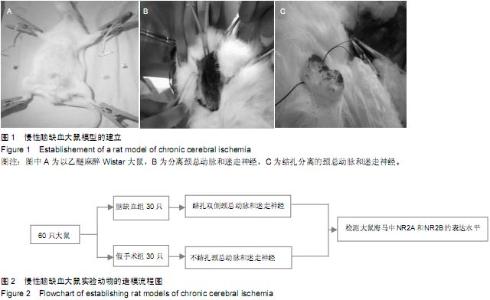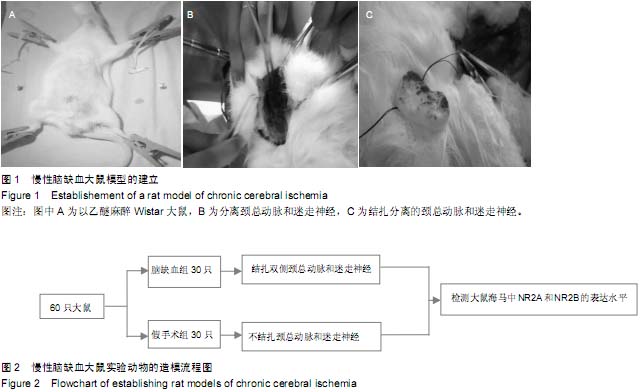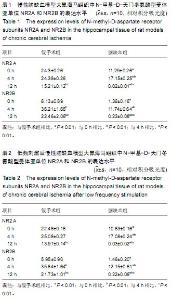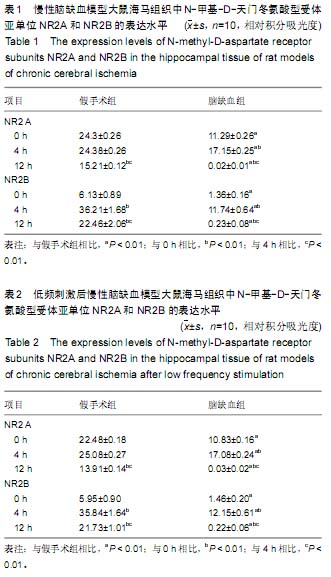Chinese Journal of Tissue Engineering Research ›› 2015, Vol. 19 ›› Issue (40): 6498-6503.doi: 10.3969/j.issn.2095-4344.2015.40.019
Previous Articles Next Articles
The regulating effect of N-methyl-D-aspartate receptor on neural synaptic plasticity in a rat model of chronic cerebral ischemia
Wang Lu1, Huo Shuai1, Wang Ya-fei2, Zhao Lin1, Liu Bo-feng1, Ruan Cai-lian1, Hui Xue-feng1
- 1Department of Anatomy, Yan’an University School of Medicine, Yan’an 716000, Shaanxi Province, China; 2Department of Neurosurgery, the People’s Hospital of Yan’an, Yan’an 716000, Shaanxi Province, China
-
Online:2015-09-30Published:2015-09-30 -
Contact:Huo Shuai, Studying for master’s degree, Department of Anatomy, Yan’an University School of Medicine, Yan’an 716000, Shaanxi Province, China -
About author:Wang Lu, Master, Associate professor, Department of Anatomy, Yan’an University School of Medicine, Yan’an 716000, Shaanxi Province, China -
Supported by:This study was supported by a grant from the Medical and Scientific Research Project of Shaanxi Provincial Family Planning Commission of China, No. 2014D30; a grant from Science and Technology Research Development Program in 2013 of Yanan City in China, No. 2013-kw33
CLC Number:
Cite this article
Wang Lu, Huo Shuai, Wang Ya-fei, Zhao Lin, Liu Bo-feng, Ruan Cai-lian, Hui Xue-feng. The regulating effect of N-methyl-D-aspartate receptor on neural synaptic plasticity in a rat model of chronic cerebral ischemia [J]. Chinese Journal of Tissue Engineering Research, 2015, 19(40): 6498-6503.
share this article
| [1] Andres AL, Regev L, Phi L, et al. NMDA receptor activation and calpain contribute to disruption of dendritic spines by the stress neuropeptide CRH. J Neurosci. 2013;33(43):16945- 16960. [2] Cho T, Ryu JK, Taghibiglou C, et al. Long-term potentiation promotes proliferation/survival and neuronal differentiation of neural stem/progenitor cells. PLoS One. 2013;8(10):e76860. [3] Kutsuwada T, Sakimura K, Manabe T, et al. Impairment of suckling response, trigeminal neuronal pattern formation, and hippocampal LTD in NMDA receptor epsilon 2 subunit mutant mice. Neuron. 1996;16(2):333-344. [4] Bakhshishayan S, Enomoto A, Tsuji T, et al. Protein kinase A regulates the long-term potentiation of intrinsic excitability in neonatal trigeminal motoneurons. Brain Res. 2013;1541:1-8. [5] Kuner T, Schoepfer R. Multiple structural elements determine subunit specificity of Mg2+ block in NMDA receptor channels. J Neurosci. 1996;16(11):3549-3558. [6] Pláteník J, Kuramoto N, Yoneda Y. Molecular mechanisms associated with long-term consolidation of the NMDA signals. Life Sci. 2000;67(4):335-364. [7] Kutsuwada T, Kashiwabuchi N, Mori H, et al. Molecular diversity of the NMDA receptor channel. Nature. 1992; 358 (6381):36-41. [8] dela Torre R, Larkin J, Singer A, et al. Fabrication and characterization of solid-state nanopore arrays for high-throughput DNA sequencing. Nanotechnology. 2012; 23(38):385308. [9] 王兴华,李露斯.两种大鼠2VO模型制作方法的比较[J].第三军医大学学报,2013,24(12):1496. [10] Luo J, Bosy TZ, Wang Y, et al. Ontogeny of NMDA R1 subunit protein expression in five regions of rat brain. Brain Res Dev Brain Res. 1996;92(1):10-17. [11] Bliss TV, Gardner-Medwin AR. Long-lasting potentiation of synaptic transmission in the dentate area of the unanaestetized rabbit following stimulation of the perforant path. J Physiol. 1973;232(2):357-374. [12] 朱丽君,张纬萍,魏尔清,等.小鼠持续性脑缺血后NMDA受体亚单位表达的变化[J].浙江大学学报(医学版),2002,31(2):68-71. [13] Massey PV, Johnson BE, Moult PR, et al. Differential roles of NR2A and NR2B-containing NMDA receptors in cortical long-term potentiation and long-term depression. J Neurosci. 2004;24(36):7821-7828. [14] Liu L, Wong TP, Pozza MF, et al. Role of NMDA receptor subtypes in governing the direction of hippocampal synaptic plasticity. Science. 2004;304(5673):1021-1024. [15] 周秋雯,徐建国.慢性疼痛动物模型的研究进展[J].医学研究生学报,2008,21(6):638-642. [16] Qu XX, Cai J, Li MJ, et al. Role of the spinal cord NR2B-containing NMDA receptors in the development of neuropathic pain. Exp Neurol. 2009;215(2):298-307. [17] Petrenko AB, Yamakura T, Baba H, et al. The role of N-methyl-D-aspartate (NMDA) receptors in pain: a review. Anesth Analg. 2003;97(4):1108-1116. [18] Loftis JM, Janowsky A. The N-methyl-D-aspartate receptor subunit NR2B: localization, functional properties, regulation, and clinical implications. Pharmacol Ther. 2003;97(1):55-85. [19] Mori H, Mishina M. Structure and function of the NMDA receptor channel. Neuropharmacology. 1995;34(10): 1219-1237. [20] 林春,林国威,郑伟,等.NMDA受体NR2B亚单位在慢性内脏痛觉敏化中的作用[J].中国药理学通报,2008,24(8):1015-1018. [21] 曲晓秀,李鸣佳,蔡捷,等.蛛网膜下腔应用Ro 25-6981对神经病理痛大鼠的镇痛作用及其电生理学机制研究[J].中国疼痛医学杂志,2008,14(2):87-91. [22] Gogas KR. Glutamate-based therapeutic approaches: NR2B receptor antagonists. Curr Opin Pharmacol. 2006;6(1):68-74. [23] Gu X, Zhang J, Ma Z, et al. The role of N-methyl-D-aspartate receptor subunit NR2B in spinal cord in cancer pain. Eur J Pain. 2010;14(5):496-502. [24] Geng SJ, Liao FF, Dang WH, et al. Contribution of the spinal cord BDNF to the development of neuropathic pain by activation of the NR2B-containing NMDA receptors in rats with spinal nerve ligation. Exp Neurol. 2010;222(2): 256-266. [25] Taniguchi K, Shinjo K, Mizutani M, et al. Antinociceptive activity of CP-101,606, an NMDA receptor NR2B subunit antagonist. Br J Pharmacol. 1997;122(5):809-812. [26] Zhang W, Shi CX, Gu XP, et al. Ifenprodil induced antinociception and decreased the expression of NR2B subunits in the dorsal horn after chronic dorsal root ganglia compression in rats. Anesth Analg. 2009;108(3): 1015-1020. [27] Salter MW, Kalia LV. Src kinases: a hub for NMDA receptor regulation. Nat Rev Neurosci. 2004;5(4):317-328. [28] Abe T, Matsumura S, Katano T, et al. Fyn kinase-mediated phosphorylation of NMDA receptor NR2B subunit at Tyr1472 is essential for maintenance of neuropathic pain. Eur J Neurosci. 2005;22(6):1445-1454. [29] 史长喜,马正良,钟好,等.CB2受体激动剂JWH015对大鼠神经病理性疼痛的治疗作用[J].国际麻醉学与复苏杂志,2009,30(3): 231-235. [30] 王景阳.疼痛与N-甲基-D-天冬氨酸(NMDA)受体[J].实用疼痛学杂志.2005,1(2):111-114. [31] 韩太真,李延海.NMDA 受体的结构与药理学特性[J].心理科学进展,2008,16(3):464-474. [32] Parsons CG. NMDA receptors as targets for drug action in neuropathic pain. Eur J Pharmacol. 2001;429(1-3):71-78. [33] Bruening-Wright A, Larsson HP. Slow conformational changes of the voltage sensor during the mode shift in hyperpolarization-activated cyclic-nucleotide-gated channels. J Neurosci. 2007;27(2):270-278. [34] Savelieva I, Camm AJ. I f inhibition with ivabradine : electrophysiological effects and safety. Drug Saf. 2008;31(2): 95-107. [35] Cheng L, Sanguinetti MC. Niflumic acid alters gating of HCN2 pacemaker channels by interaction with the outer region of S4 voltage sensing domains. Mol Pharmacol. 2009;75(5): 1210-1221. [36] 魏辉明,麻伟青,李治贵,等.NR2B在神经病理性痛大鼠海马突触长时程增强易化中的作用[J].中华麻醉学杂志,2009,29(9):792. [37] Matt L, Michalakis S, Hofmann F, et al. HCN2 channels in local inhibitory interneurons constrain LTP in the hippocampal direct perforant path. Cell Mol Life Sci. 2011;68(1):125-137. [38] 陈爱琴,林春.杏仁核脑片场电位的记录及其应用[J].第四军医大学学报,2012,12(19):1780-1782. [39] 陈爱琴,陈晓春,周瑞祥,等.5-HT_2受体-磷脂酶C的激活易化大鼠基底外侧杏仁核突触可塑性的研究[J].神经解剖学杂志,2008, (5):529-532. [40] Suzuki R, Dickenson A. Spinal and supraspinal contributions to central sensitization in peripheral neuropathy. Neurosignals. 2005;14(4):175-181. [41] Bliss TV, Lomo T. Long-lasting potentiation of synaptic transmission in the dentate area of the anaesthetized rabbit following stimulation of the perforant path. J Physiol. 1973; 232(2):331-356. [42] Liu XG, Sandkühler J. Long-term potentiation of C-fiber-evoked potentials in the rat spinal dorsal horn is prevented by spinal N-methyl-D-aspartic acid receptor blockage. Neurosci Lett. 1995;191(1-2):43-46. [43] 杨坦,刘萍,舒丹,等.吗啡对外周刺激诱导的大鼠海马CA1区长时程增强(LTP)的抑制作用[J].公共卫生于预防医学,2007,3(4): 17-20. [44] 魏辉明,麻伟青,李治贵,等.神经病理性疼痛老年大鼠海马CA1区突触长时程增强的变化[J].临床麻醉学杂志,2014,33(6):1056- 1059. [45] Luo L, Chang L, Brown SM, et al. Role of peripheral hyperpolarization-activated cyclic nucleotide-modulated channel pacemaker channels in acute and chronic pain models in the rat. Neuroscience. 2007;144(4):1477-1485. [46] 刘翠英.ZD7288对慢性内脏痛大鼠痛觉敏感性的抑制作用及其机制[D].福州:福建医科大学,2009. [47] 卢大力.尼氟酸对大鼠慢性内脏高敏感形成的抑制作用[D].福州:福建医科大学,2013. [48] 何蔚.ZD7288对正常和脑缺血后海马Schaffer侧枝-CA1区突触传递和可塑性的影响[D].武汉:华中科技大学,2010. [49] Chen CT, Green JT, Orr SK, et al. Regulation of brain polyunsaturated fatty acid uptake and turnover. Prostaglandins Leukot Essent Fatty Acids. 2008;79(3-5): 85-91. [50] Darios F, Davletov B. Omega-3 and omega-6 fatty acids stimulate cell membrane expansion by acting on syntaxin 3. Nature. 2006;440(7085):813-817. [51] Fuchikami M, Morinobu S, Kurata A, et al. Single immobilization stress differentially alters the expression profile of transcripts of the brain-derived neurotrophic factor (BDNF) gene and histone acetylation at its promoters in the rat hippocampus. Int J Neuropsychopharmacol. 2009;12(1): 73-82. [52] Ueyama T, Kawai Y, Nemoto K, et al. Immobilization stress reduced the expression of neurotrophins and their receptors in the rat brain. Neurosci Res. 1997;28(2):103-110. [53] Altar CA. Neurotrophins and depression. Trends Pharmacol Sci. 1999;20(2):59-61. [54] Siuciak JA, Lewis DR, Wiegand SJ, et al. Antidepressant-like effect of brain-derived neurotrophic factor (BDNF). Pharmacol Biochem Behav. 1997;56(1):131-137. [55] Murua VS, Gomez RA, Andrea ME, et al. Shuttle-box deficits induced by chronic variable stress: reversal by imipramine administration. Pharmacol Biochem Behav. 1991;38(1): 125-130. |
| [1] | Li Zhongfeng, Chen Minghai, Fan Yinuo, Wei Qiushi, He Wei, Chen Zhenqiu. Mechanism of Yougui Yin for steroid-induced femoral head necrosis based on network pharmacology [J]. Chinese Journal of Tissue Engineering Research, 2021, 25(8): 1256-1263. |
| [2] | Li Shanshan, Guo Xiaoxiao, You Ran, Yang Xiufen, Zhao Lu, Chen Xi, Wang Yanling. Photoreceptor cell replacement therapy for retinal degeneration diseases [J]. Chinese Journal of Tissue Engineering Research, 2021, 25(7): 1116-1121. |
| [3] | Zhao Xiang, Wei Cuilan, Zhang Yeting. Neurogenesis and neuroinflammation under exercise: alteration and regulation [J]. Chinese Journal of Tissue Engineering Research, 2021, 25(5): 813-820. |
| [4] | Zhu Rui, Zeng Qing, Huang Guozhi. Ferroptosis and stroke [J]. Chinese Journal of Tissue Engineering Research, 2021, 25(23): 3734-3739. |
| [5] | Huang Zhusong, Lin Yu, Chen Xiang, Lan Jinfu, Guan Yong, Gao Xi. Alcohol extract of Morinda officinalis improves lipid metabolism and bone metabolism in ovariectomized obese rats [J]. Chinese Journal of Tissue Engineering Research, 2021, 25(2): 205-210. |
| [6] | Chen Yutong, Li Chenchen, Liu Yang, Zheng Yaqin, Yang Xihua, An Meiwen. Establishment of an acute radioactive skin injury model in Wistar rats [J]. Chinese Journal of Tissue Engineering Research, 2021, 25(2): 237-241. |
| [7] | Su Mingzhu, Ma Yuewen. Radial extracorporeal shock wave therapy regulates the proliferation and differentiation of neural stem cells in the hippocampus via Notch1/Hes1 pathway after cerebral ischemia [J]. Chinese Journal of Tissue Engineering Research, 2021, 25(19): 3009-3015. |
| [8] | Dai Yaling, Chen Lewen, He Xiaojun, Lin Huawei, Jia Weiwei, Chen Lidian, Tao Jing, Liu Weilin. Construction of miR-146b overexpression lentiviral vector and the effect on the proliferation of hippocampal neural stem cells [J]. Chinese Journal of Tissue Engineering Research, 2021, 25(19): 3024-3030. |
| [9] | Fan Siqi, Zeng Ping, Nong Jiao, Liu Jinfu, Qian Xiaofen. Effect of Tongluo Shenggu Capsule-containing serum on osteoclasts and Toll-like receptor 4/nuclear factor-kappa B signaling pathway [J]. Chinese Journal of Tissue Engineering Research, 2021, 25(14): 2155-2160. |
| [10] | Luo Yicai, Li Hao. Effect of enhanced aryl hydrocarbon receptor expression on inflammatory response and healing of alveolar bone defects in diabetic rats [J]. Chinese Journal of Tissue Engineering Research, 2021, 25(14): 2166-2171. |
| [11] | Yang Luyao, Fu Pengyu, Tang Shuning, Zhu Rongxin, Gong Lijing . Change of Ghrelin-GHSR pathway in 4-week intermittent hypoxic exposure improving obesity in mice [J]. Chinese Journal of Tissue Engineering Research, 2021, 25(11): 1733-1739. |
| [12] |
Cen Yanhui, Xia Meng, Jia Wei, Luo Weisheng, Lin Jiang, Chen Songlin, Chen Wei, Liu Peng, Li Mingxing, Li Jingyun, Li Manli, Ai Dingding, Jiang Yunxia.
Baicalein inhibits the biological behavior of hepatocellular
carcinoma stem cells by downregulation of Decoy receptor 3 expression |
| [13] | Chen Yanlin, Xu Lin, Xu Shengjia. Effects of physical activity on hippocampal plasticity and cognition [J]. Chinese Journal of Tissue Engineering Research, 2020, 24(5): 773-779. |
| [14] | Feng Chengqin, Zeng Ping, Luo Jun, Liu Jinfu, Huang Jiaxing. Associations between vitamin D receptor gene polymorphisms and osteoarthritis: a meta-analysis [J]. Chinese Journal of Tissue Engineering Research, 2020, 24(33): 5405-5412. |
| [15] | Cao Qingjun, Yang Fenghua, Wang Hua. Hippocampal astrocytes in juvenile rats with persistent epilepsy: the role of cannabinoid receptor type 2 in regulating MAPK pathway [J]. Chinese Journal of Tissue Engineering Research, 2020, 24(32): 5179-5185. |
| Viewed | ||||||
|
Full text |
|
|||||
|
Abstract |
|
|||||



